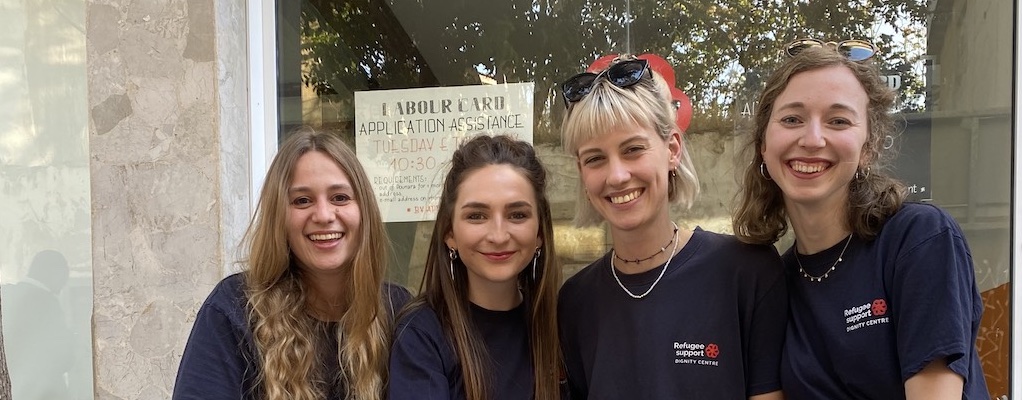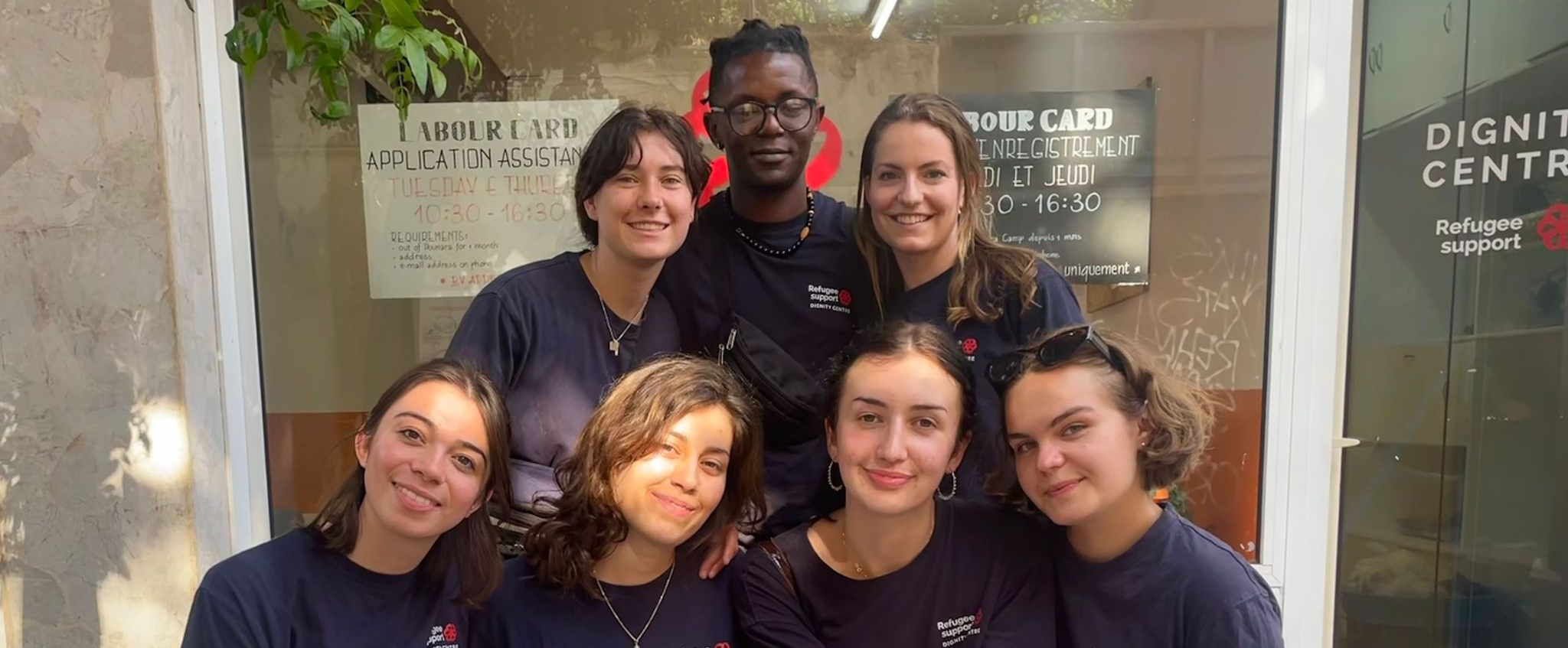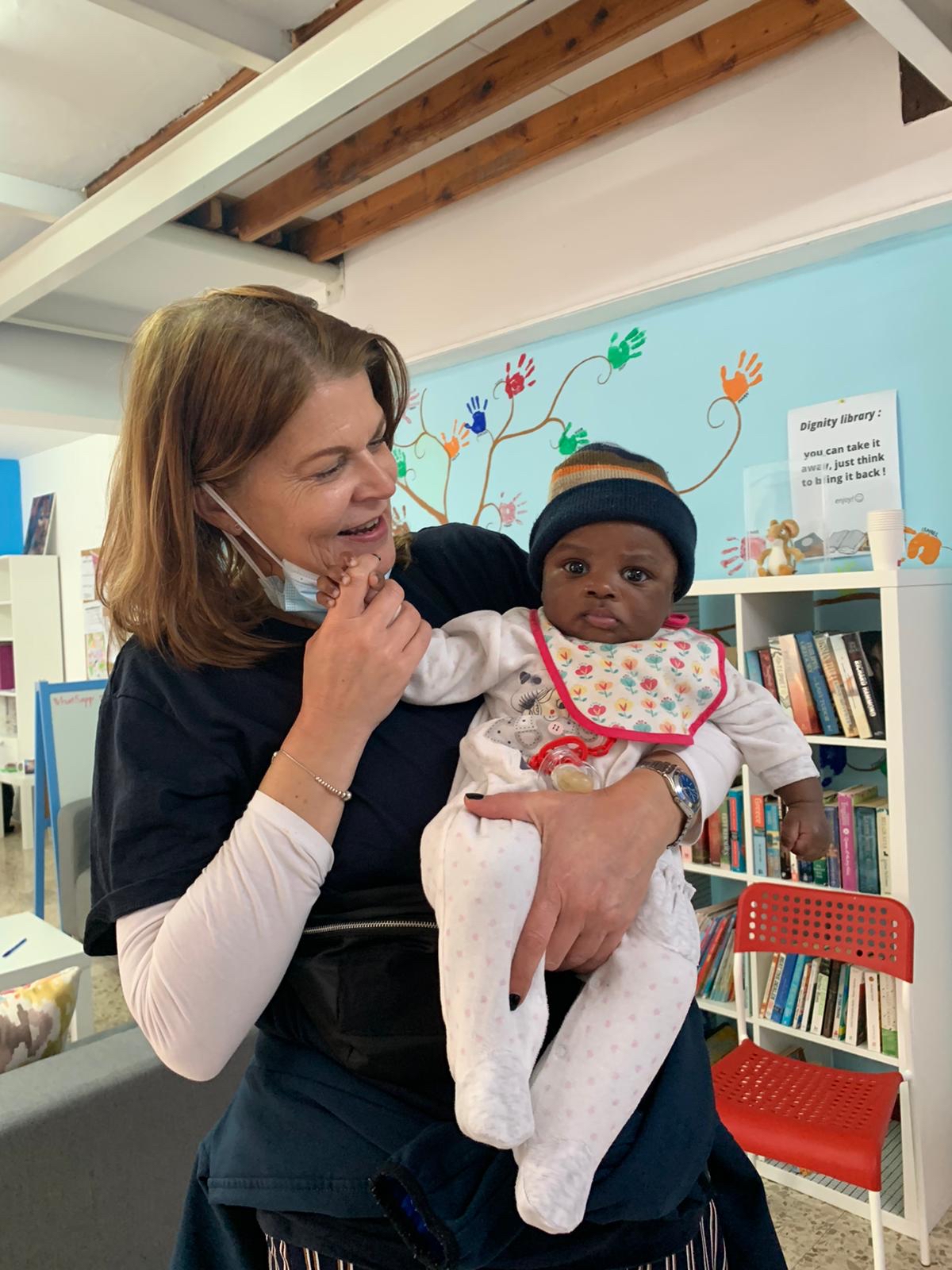I went to Moldova last month to help with the Ukrainian refugee crisis because I wanted to make a difference. It isn’t more profound than that.
 I have long felt connected to the history and culture of the former Soviet Union. I happened to be a tourist in Moscow the day Mikhail Gorbachev became General Secretary of the Community Party of the Soviet Union in March, 1985. It was my first time in that part of the world and I guess it spurred my fascination and pursuit of an advanced degree in “Soviet Studies” (I know, I am dating myself). As part of my degree, I traveled to many of the former Soviet republics and countries of what was then called “Eastern Europe.” I even scored a gig as a tour guide in Moscow to maintain my Russian visa, ostensibly to conduct research for my dissertation but also because I thought hanging out in Red Square every night was pretty cool. My first job back in the States was as Country Director for Russia, Ukraine, and the Caucasus in the Office of the U.S. Secretary of Defense. I returned to Russia, this time as a U.S. government official accompanying Vice President Gore to meetings in the Kremlin – on my old stomping grounds, Red Square. Ironically, my policy portfolio at the Pentagon included advancing Ukraine’s (and Russia’s, by the way) partnership with NATO.
I have long felt connected to the history and culture of the former Soviet Union. I happened to be a tourist in Moscow the day Mikhail Gorbachev became General Secretary of the Community Party of the Soviet Union in March, 1985. It was my first time in that part of the world and I guess it spurred my fascination and pursuit of an advanced degree in “Soviet Studies” (I know, I am dating myself). As part of my degree, I traveled to many of the former Soviet republics and countries of what was then called “Eastern Europe.” I even scored a gig as a tour guide in Moscow to maintain my Russian visa, ostensibly to conduct research for my dissertation but also because I thought hanging out in Red Square every night was pretty cool. My first job back in the States was as Country Director for Russia, Ukraine, and the Caucasus in the Office of the U.S. Secretary of Defense. I returned to Russia, this time as a U.S. government official accompanying Vice President Gore to meetings in the Kremlin – on my old stomping grounds, Red Square. Ironically, my policy portfolio at the Pentagon included advancing Ukraine’s (and Russia’s, by the way) partnership with NATO.
Fast forward over two decades later and Putin invades Ukraine. Early in the war, the Russians bombed the Yavoriv facility in western Ukraine. Building up Yavoriv as a training center for NATO exercises had been a policy priority when I was at the Pentagon. My eyes glued to CNN, I recognized the buildings the Russians were hitting. I reached out to the Ukrainians I knew from my time at the Defense Department and asked what I could do to help. The answer was always the same: “Please ask your president to send us more weapons.” A few former Pentagon coworkers and I created a WhatsApp chat group to brainstorm. I did my best to share ideas and contacts but it was hardly enough. I felt angry, helpless, and guilty.
As the plight of refugees increasingly took center stage, I thought of another way to help. I turned to Refugee Support Europe (RSE), the non-governmental organization (NGO) with whom I volunteered a few years ago in Katsikas, Greece to provide humanitarian assistance to refugees from Syria, Afghanistan, and many countries of Africa. I texted Paul, RSE’s CEO, who informed me that he was in fact heading a site visit to Moldova in the coming days. I asked if I could join. Paul readily agreed.
When I told my husband about my plans, he was surprised at the suddenness of my decision but also supportive (though as I learned later, more concerned than he let on). When I shared with my coaching clients why going to Moldova was important to me and reassured them that our sessions would not be affected, they were all encouraging. My clients are awesome. I announced on Facebook that I was going to Moldova and weirdly discovered that a number of friends had connections to Moldova: a friend from Oxford knew the president of the country, the company where an ex-boyfriend now works has an office in Chisinau, and another friend knew a Peace Corps volunteer who just returned from Moldova.
A week later, I arrived in Chisinau by bus from Bucharest, dropped off my bag at my guest house, and headed to dinner to meet the RSE team. As I walked up a dark street in central Chisinau toward Restaurant Tbilisi, I was startled as one familiar face came into focus: I hugged Dan tight as a flood of happy memories returned. Dan had been my boss when I was an RSE volunteer in Katsikas. One Sunday in Greece, on our day off, Dan took Maggie (an awesome RSE volunteer from Australia) and I on his favorite hike in the nearby mountains, albeit in three feet of snow. That hike…as well as learning from Dan how best to support displaced persons…were highlights of my experience with RSE in Greece.
My reunion with Dan should not have been a surprise. Hundreds of volunteers have joined RSE for a several week stint at any of its refugee centers across the globe. But a small, core group pops up again and again, whenever and wherever duty calls. A few days after I got to Chisinau, appearing at Paul’s morning meeting was Paula, who had just arrived from Spain. Paula had been my other boss in Katsikas and was taking over from Paul as RSE lead in Chisinau.
Our mission was to determine RSE’s role in Moldova: What was the greatest need? Where should we even go? While visiting Moldova’s border with Ukraine, where refugees were arriving in record numbers, Paul observed that a number of NGOs were already on the ground, helping new arrivals with food, clothing, and essential information. RSE didn’t want to duplicate those efforts. Though some refugees were staying at the border longer than they wanted, most kept moving. But to where?
There were/are roughly three groups of refugees arriving from Ukraine in Moldova. First, those who go straight through to family or friends in Europe, the United States, Canada, etc. They didn’t need our help. The second group were Ukrainians with sufficient financial resources to check themselves into a hotel in Chisinau, wait out the Russians, and (hopefully) return home in short order. They didn’t need our assistance either, as evidenced by the Mercedes and Land Rovers with Ukrainian plates parked in front of the Chisinau Radisson Blu. (Many Ukrainians also stayed at less expensive hotels and guesthouses). The third group were Ukrainians who had neither foreign connections to get them out nor sufficient financial resources to support themselves for an indeterminate period of time. Most were staying with host Moldovan families while they figured things out. It bears noting that Moldova is the poorest country in Europe and the story of everyday Moldovans who have opened up their homes to Ukrainian strangers is a whole other story that needs to be told.
After assessing the situation, RSE decided to establish its presence in Chisinau and focus on helping those Ukrainians in group three. We would operate a Dignity Centre, based on the RSE model, which would consist of a shop on one side and a children’s play area on the other.
None of us on the RSE team knew much about Moldova so we needed to figure out the details quickly. We met with larger international agencies and smaller NGOs already on the ground, as well as local government officials. Those Facebook connections led us to others with perspective, expertise, and still other connections. Within a matter of days, RSE signed two leases in downtown Chisinau, one to serve as our Dignity Centre and the other to house staff and volunteers. We secured additional warehouse space, rented vehicles, and established partnerships with local grocery stores. We scrubbed both buildings clean. Since able-bodied men are largely prevented from leaving Ukraine, most refugees are women, children, and the elderly. One of my first jobs was to scout the city’s furniture and toy stores for a children’s table and chairs, crayons, paints and games. Owing to the urgency of the situation, RSE’s agility in making decisions, and the flexibility Paul gave us to execute, we opened one week from the day we arrived.
We aligned our Dignity Centre to RSE’s mission to provide “assistance with dignity.” Eligible Ukrainians could “purchase,” with points based on family size, a variety of basic items: flour, sugar, coffee, canned meat, Pampers, baby shampoo, sanitary napkins, and even pet food. This approach differed from most other (awesome) NGOs who distributed pre-selected parcels of whatever they thought the Ukrainians needed most, electing to sacrifice choice for efficiency. That is not a bad approach, just different from RSE’s.
Our Dignity Centre would look and function like a real grocery store rather than a humanitarian assistance distribution center. We organized the shelves meticulously, labels facing the same direction, lined up perfectly. All volunteers shared responsibility for keeping the shelves fully stocked at all times to show respect for our customers. Our customers’ choices informed which items we continued to stock. We bought more of those items that routinely sold out and discontinued the less-popular.
On the eve of opening the shop, I realized I was a bit nervous. What will be the mood of the Ukrainians just arriving here from a war zone? What is the “right” way to respond to whatever range of emotions they might display – fear, anger, sadness?
My initial anxiety dissipated quickly. In fact, our customers displayed a demeanor I can only describe as a combination of stoicism, pride, shock, disbelief. Some of our Ukrainian customers just wanted to shop. They weren’t interested in conversing. Others wanted to share their feelings and experiences. I followed their lead and never pried. I might ask where they were from, and share if I had ever been to their home town. But then I would tread carefully. I will never forget one elderly man who was intent on me watching a video on his phone of his house being destroyed. I wasn’t sure if I should respond with sympathy, anger, etc. Drawing from my coaching of veterans with PTSD, I concluded that he might be less interested in my particular reaction than in having someone bear witness to his loss. After watching this man’s video four times, I gently reminded him that others were waiting in line behind him. Then I excused myself, went outside, and broke down.
 I could go on about the children who accompanied their parents and grandparents to our shop. Kids are kids…some were rambunctious while others were more subdued. I did observe that those most quiet on the surface painted and drew the most graphic and often heartbreaking drawings in our kids’ play area across the room. Most poignant was seeing these kids assuming roles beyond their years: helping their parents decide what the family needed for basic survival, taking charge of packing up their groceries, and carrying their bags out to the street. As I watched them, I could only think they should be home, going to school, playing with friends, and doing other kid things. Those memories continue to haunt me.
I could go on about the children who accompanied their parents and grandparents to our shop. Kids are kids…some were rambunctious while others were more subdued. I did observe that those most quiet on the surface painted and drew the most graphic and often heartbreaking drawings in our kids’ play area across the room. Most poignant was seeing these kids assuming roles beyond their years: helping their parents decide what the family needed for basic survival, taking charge of packing up their groceries, and carrying their bags out to the street. As I watched them, I could only think they should be home, going to school, playing with friends, and doing other kid things. Those memories continue to haunt me.
One aspect common to all of our Ukrainian customers: They thanked us profusely. Many asked where I was from and where did we get the money to buy the items in the shop. They were incredulous and humbled when I told them I was from the United States, RSE was based in the UK, and our funding came from private donations across the world. Some would grab on to us or hug us with tears in their eyes. When people thanked us, I initially found it hard to say, “You’re welcome.” I thought I might sound condescending. But the more I observed, the more I concluded that acknowledging their gratitude was treating them like human beings, not supplicants.
I hope I have been able to share some of what I learned about the situation for Ukrainians who have fled Russia’s invasion, as well as about myself when I put myself in this unfamiliar and uncomfortable situation. A final observation: We closed the shop every day at 5pm, swept, restocked for the next day, and then I would head back to my guest house. My most vivid memory of my month in Moldova is that hour-long walk from one end of Chisinau to the other, and how energized I felt after what was inevitably a physically and emotionally exhausting day. I would reflect on the number of times our shelves had been emptied and refilled over the last eight hours. Unlike with my corporate jobs over the years, rewarding in other ways, here in Chisinau, I could see the direct, tangible, and essential impact I was having on peoples’ lives – evidenced not only by the steady restocking of emptied shelves, but also by the looks on our customers’ faces, their expressions of appreciation (in whatever language or form of communication we could muster together), and their dignity as they hauled their overstuffed and heavy grocery bags on to Gagarin Boulevard.
That’s why I get super uncomfortable when people compliment or commend me for going to Moldova. I received so much more than I gave. Over the course of four short weeks, I was reassured of my own capacity to be compassionate and kind and my ability to show genuine empathy. I am grateful to our Ukrainian customers for giving me that reminder. I was a different person on my flight home than I was when I first arrived in Moldova. And I hope a better one.
Reposted from an article posted on Scott Nadlers website.












